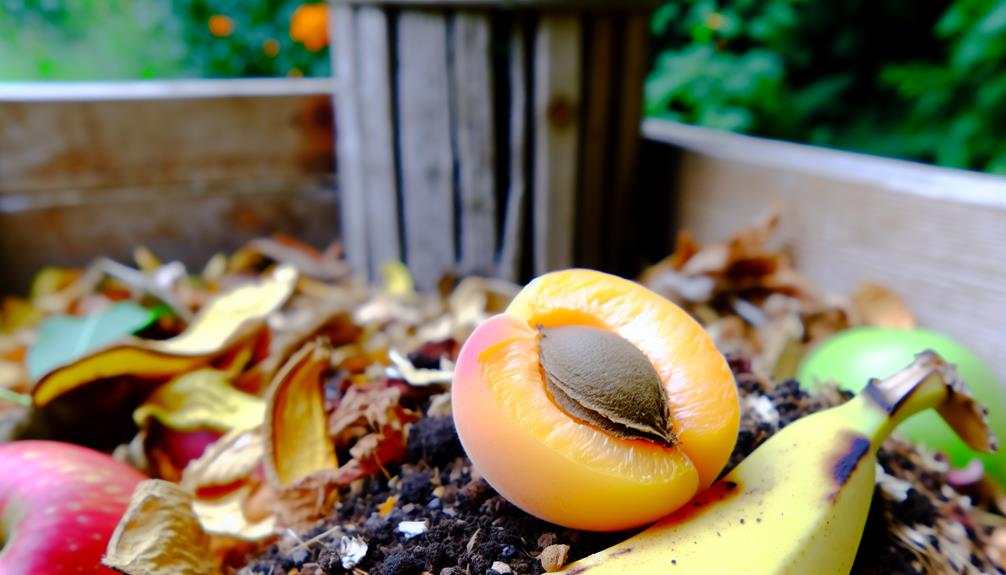

Yes, you can compost apricot pits, but they decompose very slowly due to their hard shells. To speed up the process, crush or break them into smaller pieces. Always make sure they’re mixed well with other compost materials. Keep your compost pile moist and turn it regularly to enhance aeration and decomposition.
Be mindful of the amygdalin in the pits, which can release cyanide, so distribute them evenly for safe, balanced breakdown. Apricot pits can take over a year to compost fully, but proper preparation and maintenance will improve their decomposition rates. You’ll gain more insights into composting efficiently.
Composting transforms organic waste into nutrient-rich soil, making it an essential practice for any eco-conscious gardener. To start composting, you’ll need a balanced mix of green and brown materials. Greens include items like fruit scraps, vegetable peels, and coffee grounds, while browns consist of dried leaves, cardboard, and small branches.
Here’s a simple guide to get you started:
While composting offers numerous benefits, dealing with apricot pits can present some unique challenges. Apricot pits are extremely hard and take a long time to break down, which means they can remain intact in your compost pile for years if not handled properly. To speed up decomposition, consider crushing or grinding the pits before adding them to your compost.
Here’s a quick comparison of methods:
| Method | Time to Decompose |
|---|---|
| Whole Pit | Several Years |
| Crushed Pit | 1-2 Years |
| Ground Pit | 6-12 Months |
| Commercial Aid | 3-6 Months |
Additionally, apricot pits contain amygdalin, which can release cyanide. Make sure they’re well-distributed and decomposed to avoid any potential toxicity.
Also Read: Can You Compost Cotton Balls? The Shocking Truth Revealed!
Composting apricot pits offers several benefits you shouldn’t overlook. By adding them to your compost, you create a nutrient-rich soil amendment that enhances plant growth. Additionally, you’ll reduce waste and improve soil aeration, making your garden more sustainable and productive.
Incorporating apricot pits into your compost can greatly enhance the nutrient profile of your soil. These pits break down slowly, releasing crucial nutrients over time, which helps create a more balanced and fertile soil environment.
Here are three key benefits:
Transforming apricot pits into compost is an effective strategy to reduce waste and contribute to a sustainable environment. By composting these hard pits, you’re diverting waste from landfills, where it would otherwise take years to decompose.
Instead, you’re repurposing a natural resource. To do this, you need to crush or grind the pits. This accelerates their decomposition. Add the crushed pits to your compost pile along with other organic waste like vegetable scraps and yard trimmings.
Regularly rotate the pile to guarantee even decomposition. Over time, the apricot pits will break down, enriching your compost. This process not only reduces waste but also provides a valuable soil amendment for your garden.
Crushed apricot pits in your compost can greatly enhance soil aeration, leading to healthier plant roots and improved water drainage. By incorporating these pits, you introduce small, durable particles that create air pockets in the soil. This enhances root oxygenation and prevents soil compaction.
Here are three key benefits:
Add crushed apricot pits to your compost to reap these benefits and foster a healthier garden ecosystem.
Also Read: Can You Compost Agave?
To start preparing your apricot pits for composting, first clean the pits thoroughly to remove any remaining fruit.

Next, crush the cleaned pits to help expedite their decomposition.
Begin by thoroughly rinsing the apricot pits under running water to remove any remaining fruit residue. This step is important because leftover fruit can attract pests and hinder the composting process. Once rinsed, follow these steps:
These steps will prepare the pits effectively for composting.
Breaking the apricot pits into smaller pieces will greatly accelerate their decomposition in the compost pile. Start by placing the pits on a sturdy surface, like a wooden board. Use a hammer or a heavy object to gently break them apart. Be cautious to avoid flying shards. Crushing the pits increases the surface area, allowing microbes to break them down more efficiently.
If you have a grinder, you can use it for a finer result. However, always make certain the equipment is suitable for hard materials to prevent damage.
After crushing, mix the pieces evenly into your compost. This step will help the apricot pits decompose faster, enriching your compost with valuable nutrients sooner.
Also Read: Can You Compost Bacon?
Accelerate the decomposition of apricot pits by chopping them into smaller pieces before adding them to your compost pile. This process increases the surface area, allowing microbes to break down the material faster.
Here are three methods to further speed up decomposition:
Apricot pits can be repurposed in various creative and practical ways beyond composting. You can use them to make apricot kernel oil, which is excellent for skin care and cooking. To extract the oil, you’ll need to crush the pits and use a cold press method.

Alternatively, apricot pits can be crafted into jewelry or decorative items by sanding and polishing them. They also serve as natural air fresheners; simply place them in a bowl to add a subtle fragrance to your space.
Additionally, apricot pits can be used as a substitute for cherry pits in a heating pad. Just sew them into a fabric pouch, microwave for a few minutes, and enjoy a soothing, reusable heat source.
To conclude, composting apricot pits is feasible but requires patience and specific preparation steps. You’ll need to crush or grind the pits to speed up decomposition.
While challenging, the benefits to your compost pile are worth the effort. If you’re looking for quicker alternatives, consider using the pits for crafts or as mulch. With a bit of effort, you can make the most of these often-overlooked compostable items.
